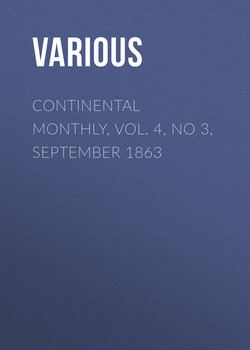Continental Monthly, Vol. 4, No 3, September 1863

Реклама. ООО «ЛитРес», ИНН: 7719571260.
Оглавление
Various. Continental Monthly, Vol. 4, No 3, September 1863
SOUTHERN HATE OF NEW ENGLAND
WAITING FOR NEWS!
EARLY HISTORY OF THE PRINTING AND NEWSPAPER PRESS IN BOSTON AND NEW YORK
RECONNOISSANCE NEAR FORT MORGAN,
THE CRUEL CARPENTER
DIARY OF FRANCES KRASINSKA;
THE ISLE OF SPRINGS
CHAPTER I
CHAPTER II
THE GRAVE
REASON, RHYME, AND RHYTHM
REMEMBRANCE
THE GREAT RIOT
THE DESERTED HOUSE
SPRING MOUNTAIN
ENDURANCE
JAPANESE FOREIGN RELATIONS
WAS HE SUCCESSFUL?
JEFFERSON DAVIS AND REPUDIATION
EDITOR'S TABLE
AMOR PATRIÆ VINCIT
THE GOOD GODDESS OF POVERTY
Отрывок из книги
To write an article on the history of the Art of Printing, without paying our respects, in the first instance, to the Devil and Doctor Faustus, will be considered not only a violation of all precedent, but, as regards those individuals, a positive breach of good manners. They have so long been associated together, not only in popular tradition but in books, that the greater part of the reading world seem to think them to have been the original partners in the republic of letters. Indeed, for some absurd reason or other, the opinion is even yet quite prevalent that one of the original concern has been a silent partner, though not a sleeping one, in every printing establishment since. The proposition, to this extent, is certainly inadmissible; and yet, from the moral condition of a large portion of the press, it must be confessed there is strong presumptive evidence that in the unhappy influences exercised by the personage referred to over the affairs of men, he is not altogether neglectful of the press. Be this, however, as it may, the press has become, in this country especially, an engine of such great importance in the daily affairs of life – its energies are of such tremendous power, either for good or evil, that it is believed a few moments can be profitably spent in glancing at its rise and early progress in Boston and New York.
The honor of setting up the first printing press in the American Colonies belongs to Massachusetts. Only eighteen years had elapsed from the landing of the Pilgrims at Plymouth, before a press was in operation at Cambridge – then as populous as Boston. The project of establishing a press in the New World was conceived and almost executed by the Rev. Jesse Glover, a dissenting clergyman in England, who had interested himself largely in planting the colony, and a portion of whose family was already in America. Mr. Glover raised the means of purchasing his press, types, and other necessary apparatus by contributions in England and Holland. With these materials he embarked for America in 1638, but died a few days before the ship reached the shore. Cambridge was at that time the seat of the civil and ecclesiastical power in Massachusetts; and as the academy which subsequently grew into Cambridge University had then been commenced, it was determined by the leading men of the colony to establish the press there; and there it remained for sixty years under their control, and forty years before a press was established in any other colony. The first printer was Stephen Day, engaged in London by Mr. Glover, and supposed to be a descendant of the celebrated John Day, the noted printer. The second printer in the Colonies was Samuel Green, to whom Day relinquished the business in 1649. Colonel Samuel Green, the late venerable editor of the New London Gazette, was a descendant in a direct line from the original printer of that name; the family having uninterruptedly engaged in that business for nearly two hundred years. The elder Green printed the Indian Bibles and Testaments for those early apostles of the New World who first engaged in the benevolent work of attempting the civilization and evangelization of the aboriginals of this country – a noble race of wild men, who have melted away before the palefaces, like the hoarfrost beneath the beams of the morning sun.
.....
As the storm of war drew on in 1775, the Mercury contained a series of patriotic papers, under the signature of the Watch Tower. But as the British forces drew near to New York, the patriotism of Gaine began to cool; and during the whole course of the Revolutionary war, his Mercury afforded very accurate indications of the state of the contest. When with the Whigs, Hugh Gaine was a Whig. When with the Royalists, he was loyal. When the contest was doubtful, equally doubtful were the politics of Hugh Gaine. In short, he was the most perfect pattern of the genuine non-committal. On the arrival of the British army he removed to Newark for a while; but soon returned to the city and published a paper devoted to the cause of the Crown. His course was a fruitful theme for the wags of the day; and at the peace, a poetical petition from Gaine to the Senate of the State, setting forth his life and conduct, was got up with a good deal of talent and humor. His paper ceased with the war.
Another paper, called the New York Gazette, was commenced by Wayman, the former associate of Parker. In 1766, Wayman was arrested for a contempt of the Assembly, upon no other charge than that of two typographical errors in printing the speech of Sir Henry Moore, the Governor of the Colony. One of these errors consisted in printing the word NEVER for ever; and the other was the omission of the word NO, by reason of which the meaning of the sentence was reversed. Wayman protested that it was a mere inadvertency; but so tenacious were legislators in those days of 'privilege,' that an investigation was instituted; but in the end the transgressor was discharged from 'durance vile,' on condition of acknowledging his fault, asking pardon, and promising to behave more circumspectly for the future.
.....